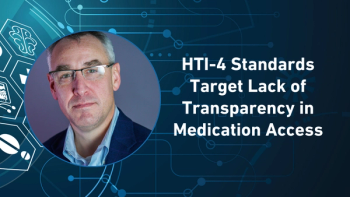
- Pharmaceutical Commerce - April 2023
- Volume 18
- Issue 2
Keeping Up with the Action
DSCSA, 340B among the headliners at the Healthcare Distribution Alliance's Distribution Management Conference.
As our publisher Mike Hennessy Jr. discusses in his "Publisher's Note," I have noticed along my travels that efforts to comply with the 2013 Drug Supply Chain Security Act (DSCSA) has been a top priority among the links that make up the aforementioned supply chain. Perhaps it was great timing that I had the opportunity to attend the Healthcare Distribution Alliance (HDA)’s annual Distribution Management Conference, which was held in Indianapolis in March. This event was special to me, given that it was the first time I’ve covered one of the association’s conferences in person, as opposed to virtually. HDA also considers this one to be its largest supply chain education event.
Although I began to reference this in my show coverage last month, I think it’s worth reminding folks that there were a wide range of topics presented at the conference for attendees to take advantage of—ranging from DSCSA coverage; traceability and serialization standards; environmental, social, and governance (ESG); and a 340B update. The topic of 340B—which was last in my list for no specific reason—featured a session held by Andrew L. Wilson, PharmD, FASHP, McKesson’s VP of 340B solutions. Wilson described how the program’s inception dates back to the early 1990s, when the Veterans Health Care Act of 1992 (VHCA) enacted Section 340B of the Public Health Services Act. In a nutshell, it allows “covered entities” to purchase “covered outpatient drugs” at reduced pricing for dispensing to “eligible patients.”
So what makes a place of business a “covered entity?” One must apply for participation, while also meeting entity-specific requirements that are set out in the statute and interpretive regulations, some of which include, but are not limited to:
- Being a government-owned or controlled hospital.
- If non-government, a non-profit that has an agreement with a government entity.
- Must be listed on the Health Resources and Services Administration (HRSA)
website . - Cannot divert product to non-patients.
Covered entities must also determine whether they will be using 340B drugs for their Medicaid patients (known as “carve-in”), or if they will be purchasing drugs for their Medicaid patients via other mechanisms (known as a “carve-out”). This is to avoid what Wilson calls a “double-dip,” formally known by HRSA as duplicate discount prohibition.
I would be remiss not to mention that the Pharmaceutical Commerce team also attended Informa’s Patient Assistance & Access Programs (PAP) show last month in Philadelphia. We took advantage of the opportunity to attend a plethora of educational seminars at our disposal—with topics ranging from “improving the patient/HCP experience while reducing overall operating costs,” to “taking a digital approach to solving the fragmented support service experience."
The team also conducted several
Nicholas Saraceno is Pharmaceutical Commerce's Editor. He can be reached at
Articles in this issue
over 2 years ago
Pharmaceutical Commerce - April 2023 Issue (PDF)over 2 years ago
Assessing Drug Pricing in Europeover 2 years ago
Pediatric Medicine: Challenges Aboundover 2 years ago
Ramping Up DSCSA Readiness Effortsover 2 years ago
High-Tech Hubs and Specialty Pharmaover 2 years ago
What is a Digital Hub in 2023?over 2 years ago
Patient Hubs in an Omnichannel Worldover 2 years ago
Solving the Omnichannel PuzzleNewsletter
Stay ahead in the life sciences industry with Pharmaceutical Commerce, the latest news, trends, and strategies in drug distribution, commercialization, and market access.




